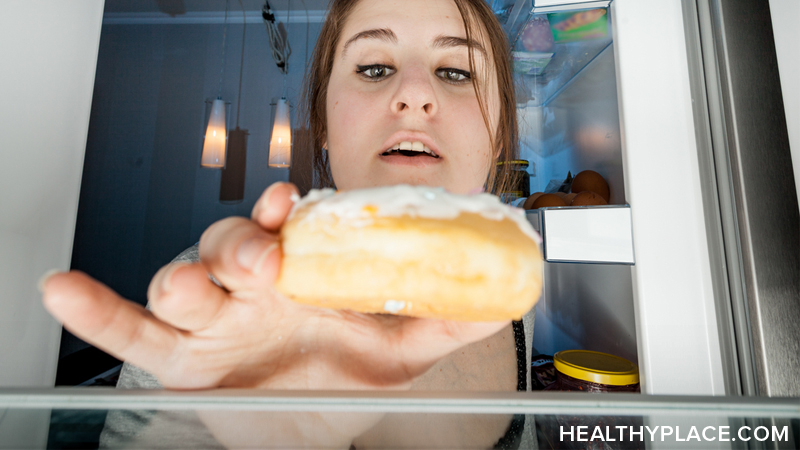Night-Eating Syndrome

A relatively new eating disorder, "night-eating syndrome," characterized by a lack of appetite in the morning & overeating at night with agitation & insomnia has been reported in a new study. "Not only is night-eating syndrome an eating disorder, but one of mood & sleep as well," said study author Albert Stunkard, MD, of the University of Pennsylvania's Weight & Eating Disorders Program. "People who fall prey to this syndrome are not simply indulging in a bad habit. They have a real clinical illness, reflected by changes in hormone levels."
The study, by a team from the University of Pennsylvania Medical Center & the University Hospital in Tromso, Norway & appearing in today's issue of the Journal of the American Medical Association, is a combination of two related studies based upon behavioral & neuro-endorcine data. The behavioral study, conducted at the University of Pennsylvania School of Medicine, attempts to define the behavioral characteristics of the syndrome in terms of the timing of caloric consumption during eating episodes, level of mood throughout the waking hours & frequency of night-time awakenings. The neuro-endocrine study, conducted at the University Hospital in Tromso, Norway, attempts to characterize the syndrome in terms of circadian profiles (occurring approximately every 24 hours) of plasma melatonin, leptin & cortisol-the hormones linked to sleep & appetite that are found in lower levels in people with night-eating syndrome.
Participants in the Penn & Norwegian Studies were monitored for food intake, mood alterations, sleep disturbances & night-time snacking, as well as hormonal fluctuations. "People with this syndrome start out daily with morning anorexia- or not eating anything all morning- & consume fewer than average calories throughout the day. As the day wears on, their mood worsens & they become more & more depressed," said Stunkard. Then comes the night, when victims raid the refrigerator & cupboards for high-carbohydrate snacks, sometimes up to four times a night. As anxiety & depression increases throughout the night, so does eating. "This snacking may be a way for these persons to medicate themselves," speculates Stunkard, "because they eat a lot of carbohydrates, increasing serotonin in the brain which in turn, leads to sleep."
Night eating syndrome signs and symptoms* The person has little or no appetite for breakfast. Delays first meal for several hours after waking up. Is not hungry or is upset about how much was eaten the night before.
* Eats more food after dinner than during that meal.
* Eats more than half of daily food intake after dinner but before breakfast. May leave the bed to snack at night.
* This pattern has persisted for at least two months.
* Person feels tense, anxious, upset, or guilty while eating.
* NES is thought to be stress related and is often accompanied by depression. Especially at night the person may be moody, tense, anxious, nervous, agitated, etc.
* Has trouble falling asleep or staying asleep. Wakes frequently and then often eats.
* Foods ingested are often carbohydrates: sugary and starch.
* Behavior is not like binge eating which is done in relatively short episodes. Night-eating syndrome involves continual eating throughout evening hours.
* This eating produces guilt and shame, not enjoyment.
Night-eating syndrome shows distinctive changes in hormones related to sleep, hunger & stress. The nighttime rise in the hormone that accompanies sleep, melatonin, is greatly decreased in night eaters, probably contributing to their sleep disturbances. Similarly, night-eaters fail to show a nighttime rise in the hormone leptin, which suppresses hunger & the stress hormone cortisol is elevated throughout a 24-hour period.
Night-eating syndrome is believed to occur in 10% of obese people seeking treatment for their obesity, which means about 10 million people may be affected. It also does occur among people of normal weight, although less frequently. "Night-eating syndrome may represent a special kind of response to stress that afflicts certain vulnerable people," said Stunkard.
Night-eating syndrome appears to differ from bulimia nervosa and binge eating. Instead of very large & infrequent binges, persons with this disorder consume relatively small snacks at night-about 270 calories-but far more frequently. In addition, their sleep is far more disturbed.
Stunkard believes that defining night-eating syndrome as a new eating disorder will encourage more research, leading to a far better understanding of the disorder. "We study what we define," said Stunkard, who is optimistic such research will lead to effective eating disorder treatments that do not now exist.
APA Reference
Tracy, N.
(2022, January 4). Night-Eating Syndrome, HealthyPlace. Retrieved
on 2024, April 16 from https://www.healthyplace.com/eating-disorders/other-eating-disorders/night-eating-syndrome


